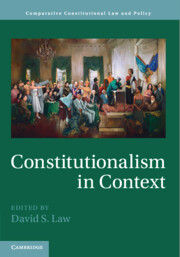Book contents
- Reviews
- Constitutionalism in Context
- Comparative Constitutional Law and Policy
- Constitutionalism in Context
- Copyright page
- Dedication
- Contents by Topic
- Contents by Region
- Figures
- Tables
- Contributors
- User’s Guide and Preface
- Abbreviations
- I Introduction to the Field
- II Concepts and Definitions
- III Constitutional Drafting and Revision
- IV Constitutional Adjudication and Interpretation
- 9 Judicial Review of Constitutional Amendments: Taiwan
- 10 Nonjudicial Constitutional Interpretation: The Netherlands
- 11 Transnational Judicial Communication: The European Union
- V Rights
- VI Structure
- VII Challenges to Liberal Democratic Constitutionalism
- Index
- References
10 - Nonjudicial Constitutional Interpretation: The Netherlands
from IV - Constitutional Adjudication and Interpretation
Published online by Cambridge University Press: 17 February 2022
- Reviews
- Constitutionalism in Context
- Comparative Constitutional Law and Policy
- Constitutionalism in Context
- Copyright page
- Dedication
- Contents by Topic
- Contents by Region
- Figures
- Tables
- Contributors
- User’s Guide and Preface
- Abbreviations
- I Introduction to the Field
- II Concepts and Definitions
- III Constitutional Drafting and Revision
- IV Constitutional Adjudication and Interpretation
- 9 Judicial Review of Constitutional Amendments: Taiwan
- 10 Nonjudicial Constitutional Interpretation: The Netherlands
- 11 Transnational Judicial Communication: The European Union
- V Rights
- VI Structure
- VII Challenges to Liberal Democratic Constitutionalism
- Index
- References
Summary
This chapter will focus on the manner in which non-judicial actors engage in constitutional guardianship, using the Netherlands as a case study. Article 120 of the Dutch Constitution explicitly prohibits courts from examining the constitutionality of Acts of Parliament. Accordingly, it has fallen to other institutions to ensure that constitutional rules and values are duly taken into account, especially when new legislation is under consideration. The chapter will focus in particular on the role that governments and civil servants play in verifying a bill’s constitutional conformity during the drafting stage; on the Council of State, which is tasked with providing non-partisan advice to the government on new bills; and on how Parliament itself goes about confronting constitutional issues during legislative debates. The Dutch experience shows that it is possible to successfully ensure constitutional supremacy even when judges are not available to act as ultimate protectors of the national constitution.
Keywords
- Type
- Chapter
- Information
- Constitutionalism in Context , pp. 216 - 235Publisher: Cambridge University PressPrint publication year: 2022
References
Primary Sources
Secondary Sources
- 1
- Cited by



